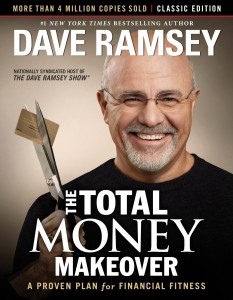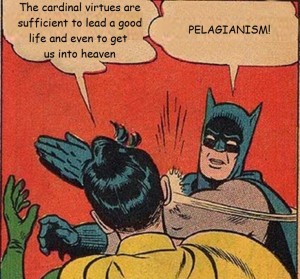In my previous column, I discussed the cardinal virtues and stated that they could be of some benefit to us in keeping our New Year’s resolutions [1]. I did not, however, discuss how (or why) the virtues are beneficial t us in this way.

So where do these virtues tie in to our new year’s resolutions? I have already given a brief description of which of the cardinal virtues might tie in to some of the more popular new year’s resolutions. I think that there are three more things to be said about virtues, and how they aide us in our resolutions.
The first is that the virtues are powers (ST II-II.56.1). Specifically, they are powers of the should which enable us to act as we ought. Now, the New Year’s resolutions which are more commonly made largely concern things which we ought to do, but which require some sacrifice on our part to do them. This sacrifice largely pertains to temperance: be it a sacrifice of time for doing something else that in the moment we would rather do, or of money that we are tempted to spend elsewhere, or of pleasures which we can do without. In some cases, it pertains (“in a restricted sense”, ST II-II.123.4R1) to fortitude.

Let us consider the very specific resolution of dieting, exercising, and losing weight. Dieting as dieting pertains to abstinence, a part of temperance. Getting up early to exercise (if in the morning) also pertains to temperance, in that it limits the pleasure of sleep. But returning to the exercising after feeling sore from the first (or hundredth) workout is an imperfect, “restricted” form of fortitude. So is cutting back portion sizes (or cutting out snacks between meals) when one feels hunger pangs. So, for that matter, is increasing a workout’s intensity (or load) when the last one seemed difficult. So much for the virtues as powers.
Second, then, is that the virtues are also habits (ST II-II.55.1-3). In considering habits in general, and virtues and vices (bad habits) in particular, the philosopher Mortimer J. Adler writes
“You know how habits get formed. To form the habit of being on time for appointments, you have to try to be punctual over and over again. Gradually, the habit of being punctual gets formed. Once it is formed, you have a firm and settled disposition to be on time in getting where you promised to be. The stronger the habit, the easier it is to act in that way and the harder it is to break the habit or to act in the opposite fashion.
When you have formed a habit and it is well-developed, you take pleasure in doing what you are in the habit of doing because you do it with ease—almost without effort. You find acting against your habits painful” (Aristotle for Everybody).
 Virtues are habits, good moral habits, and they can help us to fight bad habits. They can, moreover, help us to develop the skills or abilities that we desire, as Adler notes in continuing his discussion:
Virtues are habits, good moral habits, and they can help us to fight bad habits. They can, moreover, help us to develop the skills or abilities that we desire, as Adler notes in continuing his discussion:
“Having temperance enable us to resist what appears to be good in the short run for the sake of what is really good in the long run…Just as temperance is an habitual disposition to resist the lure of pleasures for the sake of more important goods that overindulgence in pleasure would prevent us from getting, so courage [fortitude] is an habitual disposition to take whatever pains may be involved in doing what we ought to do for the sake of a good life.
For example, we recognize that getting knowledge and developing certain skills are intellectual virtues that we ought to have. But acquiring knowledge and skills may be painful.Studying is often hard to do; learning how to play a musical instrument well, how t write well, or how to think well involves practicing that is often irksome” (Aristotle for Everybody).
There are several ways in which this ties into our New Year’s resolutions. For one thing, many of the resolutions in questions can be met once—and then forgotten. I can diet and exercise to lose weight, but once the weight is off, will I continue to diet and exercise to keep it off? If dieting and exercising have become habitual, and if the fortitude to face another workout and the temperance to resist the desire to stay in bed (or to have an extra helping at dinner) have all become habit, then my odds of keeping the weight off are good. I will not need to make losing the same 15 pounds my resolution again next year.
 To pick on another resolution, consider the popular goal of saving money. For many people, this goal might as easily be stated as To pay down my debts. Now, one popular method of doing this is to use debt consolidation: a seeming short-cut to paying less money each month to get rid of old debt. Concerning this practice, popular financial advisor Dave Ramsey writes that
To pick on another resolution, consider the popular goal of saving money. For many people, this goal might as easily be stated as To pay down my debts. Now, one popular method of doing this is to use debt consolidation: a seeming short-cut to paying less money each month to get rid of old debt. Concerning this practice, popular financial advisor Dave Ramsey writes that
“Debt CONsolidation—it’s nothing more than a con because you think you’ve done something about the debt problem. The debt is still there, as are the habits that caused it; you just moved it! You can’t borrow your way out of debt. You can’t get out of a hole just by digging out the bottom. Larry Bucket says debt is not the problem; it is the symptom. I feel debt is the symptom of overspending and undersaving.
A friend of mine works for a debt-consolidation firm whose internal statistics estimate that 78 percent of the time, after someone consolidates his credit-card debt, the debt grows back. Why? He still doesn’t have a game plan to either pay cash or not buy at all, and hasn’t saved for ‘unexpected events,’ which will also become debt” (The Total Money Makeover: A Proven Plan for Financial Fitness).
I would emphasize here that the key point is contained here: this trick doesn’t work largely because the underlying habits which caused the problem—too much debt, in particular consumer [2] debt—are still there [3]. The same thing can be said for the latest “miracle” diet drug with respect to weight loss, or for that matter to saving water and electricity (go green) by only changing to a more efficient version of a frequently-used appliance (though this can help!). Ultimately, any of these “shortcuts” may technically help us to keep our resolutions short-term, but longer-term it will be in vain. I may save some money this year, but if I then go into debt (frivolously) next year, what have I gained? Or if I lose 15 pounds by June, and then regain them by December, is my resolution actually a success?
 I would like to turn now to the third, and final, thing which is left to be said about the virtues. The virtues are important to our living a moral life, that is, to living a good life. However, they are not the only thing to living a good life, and indeed the cardinal virtues are improved on by the theological virtues of faith, hope, and love. Just as we might build upon a successfully kept resolution in our own lives, God can build upon the virtues with the gifts of and with the fruits of the Holy Spirit. Philosophy professor Peter Kreeft writes of prudence, justice, fortitude, and temperance:
I would like to turn now to the third, and final, thing which is left to be said about the virtues. The virtues are important to our living a moral life, that is, to living a good life. However, they are not the only thing to living a good life, and indeed the cardinal virtues are improved on by the theological virtues of faith, hope, and love. Just as we might build upon a successfully kept resolution in our own lives, God can build upon the virtues with the gifts of and with the fruits of the Holy Spirit. Philosophy professor Peter Kreeft writes of prudence, justice, fortitude, and temperance:
“These four are called ‘cardinal’ from the Latin word for ‘hinge.’ Al other virtues hinge on these four. That includes lesser virtues, which are corollaries of these, and aso greater virtues (the three ‘theological virtues’), which are the flower of these.
These four virtues are not the only virtues, or even the highest ones. As Einstein surpassed Newton, Jesus most certainly surpassed Plato. But just as Einstein did not contradict Newton but included him, presupposed him, and built on him, so Jesus’ supernatural virtues do not contradict Plato’s virtues but presuppose them. Plato gives us virtue’s grammar; Jesus gives us virtues’ poetry….
Of course natural [e.g. the cardinal] virtues are real virtues, just as natural reason is real reason and natural beauty is real beauty.
True, it does not save you [to be virtues in the merely natural sense]. You do not get to heaven by being a little more just, wise, courageous, and temperate, That is not enough. But it is good.
It is also a foundation for the supernatural virtues, which do get your to Heaven. A person who is unjust, foolish, cowardly, and uncontrolled will find it harder to believe, to hope in, or to love God. The natural virtues are the seedbed, soil, or fertilizer for the flower of supernatural virtue [e.g. the theological virtues]. Ethics is preparatory to religion, because ‘the law is our schoolmaster to bring us to Christ'” (Back to Virtue).
 I include this long passage because because it show that we need not stop with cultivating the natural virtues: we in fact ought to allow God to cultivate in us the supernatural ones. God does in fact build on whatever foundation we lay, if we will allow him to [4]. Venerable Louis of Grenada writes that
I include this long passage because because it show that we need not stop with cultivating the natural virtues: we in fact ought to allow God to cultivate in us the supernatural ones. God does in fact build on whatever foundation we lay, if we will allow him to [4]. Venerable Louis of Grenada writes that
“The gifts of the Holy Ghost also facilitate the operations of the virtues, animating them and strengthening them so that they will always be ready for the performance of their proper acts. Faith, hope, and charity are perfected by the gifts of wisdom and understanding; prudence, by the gifts of knowledge and counsel; justice, by the gift of piety; fortitude, by the gift of fortitude; and temperance, by the fear of the Lord” (Summa of the Christian Life).
In a similar manner, we can build on the success of keeping our New Year’s resolutions. If you ultimately want to lose 40 pounds, start with the goal of losing 15, then try for another 25 next year when that is successful. Or if you only lose 5, try to loose another 15 pounds next year. If your goal is to save up a third of your income as an emergency fund, but you save up only half of this, make saving up a third your goal next year (and then you will have a slightly more substantial emergency fund).
Remember that these New Year’s resolutions are not in themselves sufficient to make us truly happy in life, or truly fulfilled, or successful. Neither are the natural virtues by themselves sufficient to make us happy, nor saintly, nor will they get us into heaven. But, just as the New Year’s resolution (and its keeping) is a good start,so are the virtues a good start for us. They will make it easier for us to keep our resolutions, and to better our own lives. More importantly, they will enable us to allow God to work in our lives in such a way that we are able to live a good life in this world and enter into the joy of heaven in the next.
—-Footnotes—-
[1] Once, these may have been “Lenten Resolutions!”
[2] Consumer debt—there’s also student loan debt, and the mortgage. These are topics for another day, but it seems to me that there is a difference in habit between the poor college student who is $25k in debt from paying for tuition and the one who sailed through with scholarships but wracked up $20 k in debt from buying the latest in consumer electronics, etc.
[3] Dave Ramsey also notes that many of these loan consolidation companies do lower your monthly payments, in exchange for extending the period of the loan. This means that while the monthly payment may be a bit less, the period over which the payment is to be made will be extended by years, and so the total amount paid may also be greater. It’s also more difficult to attack debt one item at a time when all the debt is consolidated into a single large loan.
[4] He even offers us the perfect foundation, who is Christ.





